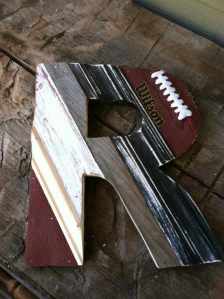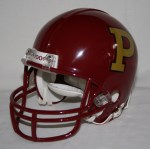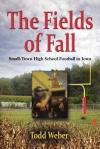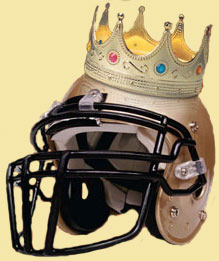 Sometimes I think I spend way too much time watching, following and generally being completely wrapped up in sports. Through four seasons of professional, college, and high school games, there is plenty of action to absorb; and there are other activities I could pursue that might be more beneficial to me personally and professionally.
Sometimes I think I spend way too much time watching, following and generally being completely wrapped up in sports. Through four seasons of professional, college, and high school games, there is plenty of action to absorb; and there are other activities I could pursue that might be more beneficial to me personally and professionally.
But when I witness a back-and-forth game that ends with a buzzer beater, marvel at a player hitting three home runs in a game, feel the exhilaration of one of my favorite teams winning a championship, or sit in the stands while one of my kids strikes out the side or sets a school record; I come to my senses and conclude that perhaps I don’t spend enough time watching games.
Sports are more than just mindless entertainment. They are a reflection of all that’s right with society and a good gauge of what human beings can accomplish. Hard work, dedication, sacrifice and sheer talent come together in contests that pit teams and individuals against each other – and most importantly, measure athletes against themselves. The winners celebrate (briefly) and go back to work to get better; while the losers lament (briefly) and go back to work to get better. Those of us whose job does not involve winning and losing athletic contests can take the lessons that great teams and individual athletes teach us and apply them to our daily lives; so we, too, can triumph in our chosen fields of endeavor.
I’ll watch most any sport and know at least a little about a lot of them, but my main focus as a spectator is on football, baseball, basketball and hockey.
Of those, I know the least about the intricacies of hockey. But thanks to the TV package I purchased, I watch lot of games – and I don’t really care who is playing. I love the speed and physicality of the game and the crazy skills of the players. I have a favorite team (Penguins) and even second, third and fourth favorites (though my youngest son Quinn tells me that’s not acceptable.)
I love basketball, but don’t watch the NBA at all. That could be separate blog post all together, but those games just look like a lot of rich guys collecting pay checks to me. Along with everyone else, I’m enthralled every March with the NCAA tournament, but I don’t have any college teams that I live and die with. High school games are my main focus as a fan during hoops season and I follow every class closely, boys and girls. The state tournaments are among my all-time favorite sporting events (amateur or pro) and a spinning leather ball ripping the nylon cords is still one of the sweetest sounds in any sport.
As a game in and of itself, baseball is the most beautiful of all the sports. Ever since I was a kid, baseball has been my favorite game to play and to dissect and study. I figured out relatively early in life that I could never play for a living, so instead I went to college and got a sports management degree and worked for six years in professional baseball with three different teams. The unchanging nature and sweet perfection of the game keeps it my favorite. The clean, unending lines; green grass; soft dirt; open sky; the hard crack of a ball against a bat and the leathery pop of the ball into a mitt; all make baseball unlike any other sport.
But football is king. No other sport consumes me as a fan in the same way as football. It’s hard to put my finger on my attraction to the game. My own playing career consisted of one intramural season in seventh grade and both my boys “retired” from football before they got to high school. But the combination of brute force, superior athletic ability and strategy makes the game completely unique. Football is like a chess match played out on a 100-yard grid and you are allowed to smash the other guy in the mouth during each move. Beauty and grace is mixed with mud, blood and mayhem. Equal parts brain and brawn; pain and joy; make up the perfect equation that is football.
While my focus on the other sports is generally limited to their seasons, football is a 12-month commitment. When I open the Internet, my home page is the Milwaukee Journal Sentinel Packers page, and I start most every day reading the latest news. Whether it’s the latest game story during the season or a blog post about signing some no-name street free agent in the spring, I have to read about it. I plan my entire fall and early winter around the Packers schedule; even the pre-season games. (I am a part-owner, after all.)
I enjoy watching random college football games but don’t get too worked up about any particular team or the bowls or the BCS or whatever the latest playoff structure is. College has basically become minor league football. There’s nothing wrong with that – it just doesn’t interest me that much.
But coming in a close second to the Packers in my sports fandom is high school football, particularly the brand that is played here in Iowa. We’re currently two seasons away from high school football, but I’ve already been pouring over the freshly published schedules and planning what matchups I might want to see in the fall. I won’t go into detail here on why I love the game so much – since I did that in my book, The Fields of Fall. The season I spent researching the book was a football fans’ dream. I got to speak to coaches, fans and players and had access to the fields, locker rooms, and even post-game social gatherings. I enjoyed blogging about my adventures on a weekly basis and sharing my experiences and insights. I blogged during the next season as well, but eventually shifted my posts toward all sports and have focused on the “sports parent” experience. (Check out my Seasons on the Run blog if you haven’t already!)
But I’ve missed writing about football only, so I’m back with this blog – cleverly titled, The Fields of Fall. I’ll be writing about issues, teams and games, and interviewing some of the people and visiting some of the places in Iowa that make the game so great – twelve months a year. Because it’s always football season.
 In the most literal definition of the term “fair-weather fan,” I became one last Friday. No, I didn’t bail on my team in their time of need, but I did make the decision to not attend a game due to the rain. I don’t mind watching my own kids in bad weather (like I’ve done for most of 2014, it seems), but if I don’t have somebody playing, I’m less enthused about freezing or getting soaked – or both. So when I looked at the forecast in the afternoon and it said there was an 85% chance of rain with some severe storms possible, Plan B just sounded too good. I called Quinn and he concurred that the temperature-controlled comfort and soft, reclining seats of a theater were preferable to a potentially soggy and cold evening on hard bleachers.
In the most literal definition of the term “fair-weather fan,” I became one last Friday. No, I didn’t bail on my team in their time of need, but I did make the decision to not attend a game due to the rain. I don’t mind watching my own kids in bad weather (like I’ve done for most of 2014, it seems), but if I don’t have somebody playing, I’m less enthused about freezing or getting soaked – or both. So when I looked at the forecast in the afternoon and it said there was an 85% chance of rain with some severe storms possible, Plan B just sounded too good. I called Quinn and he concurred that the temperature-controlled comfort and soft, reclining seats of a theater were preferable to a potentially soggy and cold evening on hard bleachers. 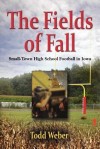 Coach Ladouceur tried his best to stay out of the spotlight and didn’t want to take all the credit for the teams’ success. He even came to be somewhat disdainful of “the streak” because of the way the media and others outside of the program became too focused on the number instead of what the winning really represented. Every time he was offered a college job that would have been much more lucrative, he turned it down because that’s “not what I do.”
Coach Ladouceur tried his best to stay out of the spotlight and didn’t want to take all the credit for the teams’ success. He even came to be somewhat disdainful of “the streak” because of the way the media and others outside of the program became too focused on the number instead of what the winning really represented. Every time he was offered a college job that would have been much more lucrative, he turned it down because that’s “not what I do.”

